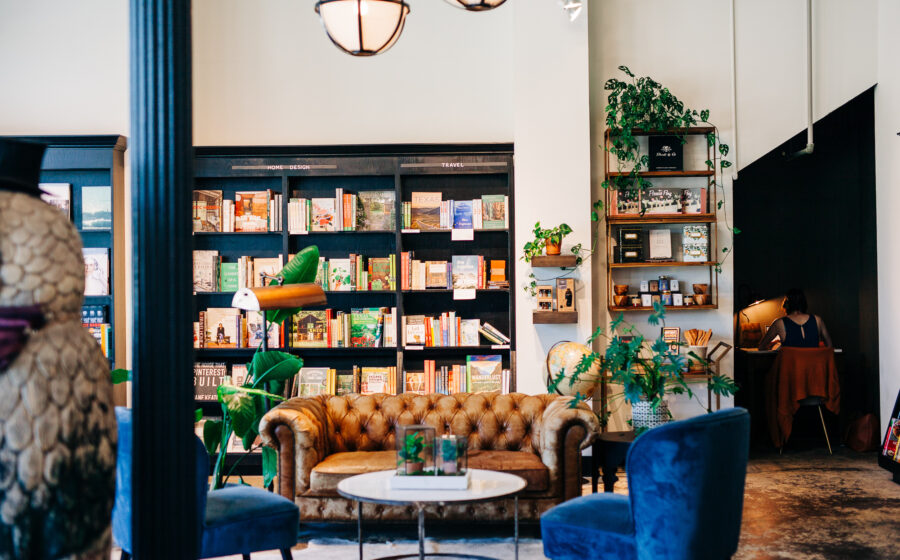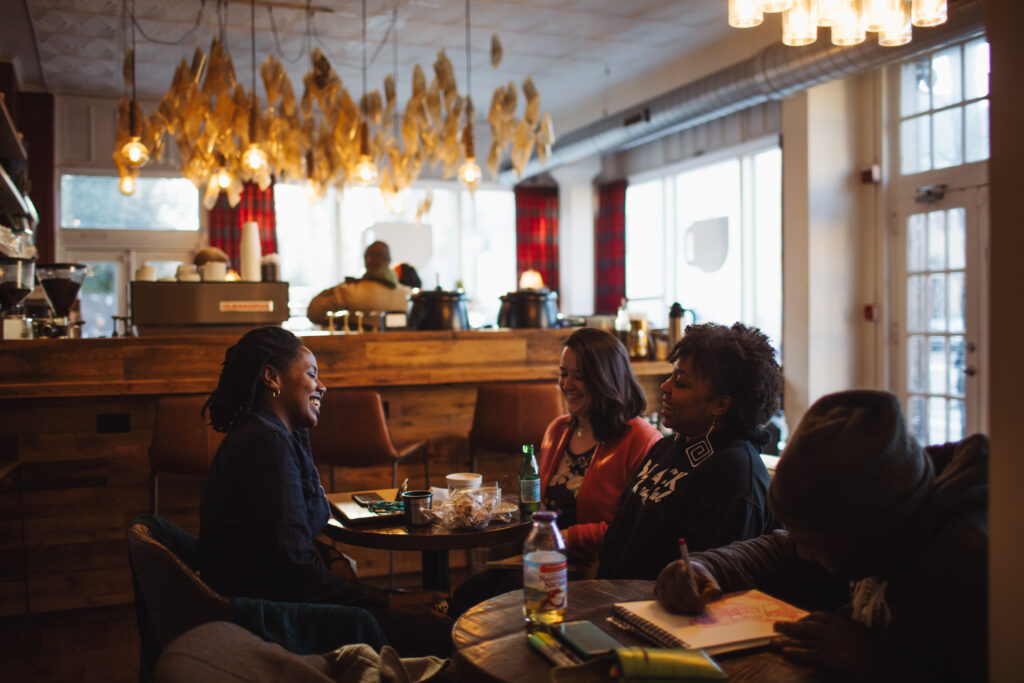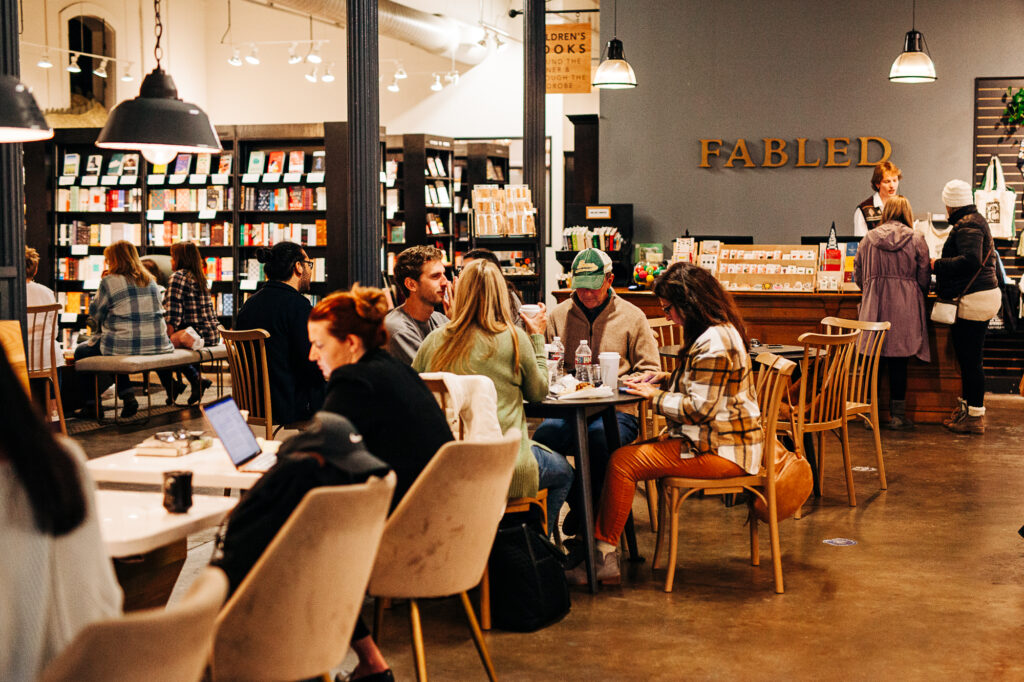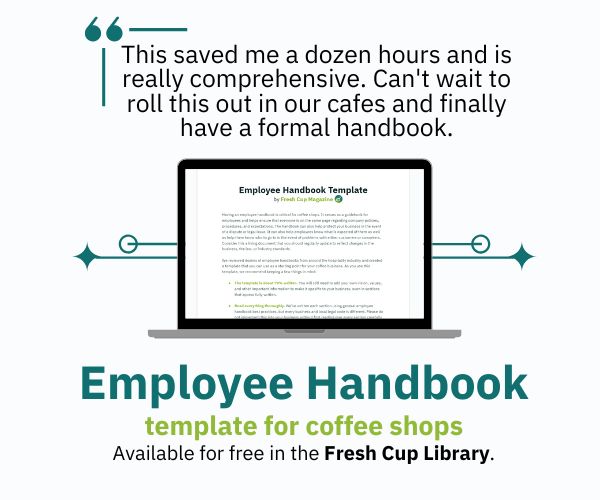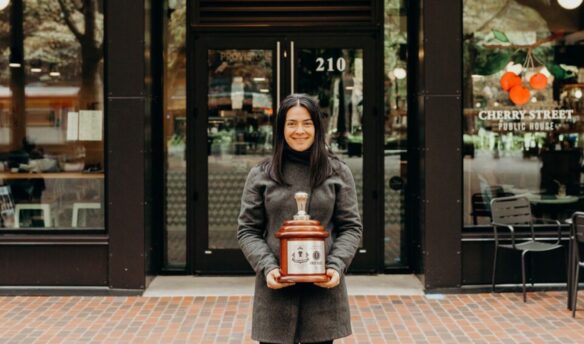In the wake of book bans, legislative targeting of marginalized groups, and the COVID-19 pandemic, bookstore cafés have taken on the responsibility to become more than just a cozy place to read. Bookstore cafés cultivate community and provide a safe haven for those in need, all while curling up with a good book and sipping on a perfect cortado.
Over the past few decades, the number of independent bookstores in the US has declined due in part to the emergence of online retailers, but that trend is shifting. Since 2009, the number of independent bookstores has increased by 34%, from 1,651 to 2,506 in 2023, and that number is expected to climb. For many young people, bookstore cafés were a place to find solace before they could access online communities or move to more welcoming areas as adults. Bookstore cafés have the power to foster connection and serve as spaces for people of all backgrounds to find acceptance and a sense of belonging—they meet an enduring need for community among all.
Community Significance
In Philadelphia, a deep love for community is evident in everything Uncle Bobbie’s does. Uncle Bobbie’s first opened five years ago with a mission to create a space where people from marginalized communities, particularly Black people, can feel seen, valued, and represented.
“We center Blackness in a way that may not happen in other spaces,” says Justin Moore, the general manager at Uncle Bobbie’s. “In many bookstores, you’ll find all of the ‘Black’ books in one area, and it will have some umbrella term like ‘urban’ or ‘African-American/Black,’ but at Uncle Bobbie’s, we separate our titles in a way that speaks to our community’s needs. We have ‘resistance,’ ‘incarceration/policing,’ and ‘race studies’ as separate sections to allow our customers to really hone in on the subject they are interested in reading and learning about.” said Moore.
Since opening, the space has become a place where people can gather, connect, and discuss the day’s politics over a cup of coffee.
“The coffee shop is what has brought the community aspect to life and made it a very tangible kind of thing,” says Moore. “In a bookstore, people may be reading and doing their thing, but they’re not interacting with each other. Whereas at Uncle Bobbie’s, we’ve got the music going, and then someone will mention something that happened in pop culture or the news, and it turns into a store-wide conversation.”
The café section of Uncle Bobbie’s creates an environment where curiosity can be sated and shared with others. “People come to our space for a lot of different reasons. There is some level of personal connection that people seek out, and even on an individual level, people come to spaces they feel are safe, where they feel that they can be seen and being represented,” says café manager Van Brooks. “People come with a little curiosity, a little hunger for knowledge. We try to nurture that with a cup of coffee and a book to bring it full circle.”
People come to our space for a lot of different reasons. There is some level of personal connection that people seek out, and even on an individual level, people come to spaces they feel are safe, where they feel that they can be seen and being represented. van brooks, uncle bobbie’s
Even the comments on their Instagram page indicate that Uncle Bobbie’s is more than a place people go to get their morning coffee or pick up a book. On March 16th, 2023—the anniversary of the day the store shut down due to COVID-19—Uncle Bobbie’s posted a note to thank their staff and customers for continuing to show support for the bookstore, and many patrons took to the comments section to express their deep gratitude for the space. “I always come back to the faith you have in us as a community,” one user wrote. “You don’t cater to us, you lead us with vision and love. We just return the care you show for us. Thank you!!!”
Navigating COVID Through Connection
The early days of COVID saw many small businesses close, highlighting to many how vital shared spaces are for community health and personal well-being. “People want real things. They saw how fast things can go away and that you can’t take it for granted,” said Maureen Rogers, owner of Chapters Books and Coffee in Newburg, Oregon.
In August 2019, Kimberly Baston opened Waco, Texas’ Fabled Bookshop and Cafe, a bookstore café in Waco, Texas, that champions the love and impact of reading. Only seven months after opening, COVID forced Fabled to shut its doors. For many small businesses, temporary closures were the sad prelude to permanent ones, but Fabled tapped into the connections they’d built with customers and were able to pivot and keep the company afloat.
They created the Indoorsy Box, a curated box of books and snacks that could be delivered locally or shipped anywhere in the country. A mother of three young children, Batson knew that her newly-found customers would still want books, and those with restless kids would need support entertaining them. “Our original goal was 30 boxes,” Batson said. “But we ended up selling almost 2,000 of these boxes in two weeks. It blew me away how our customers were so intentional about supporting something they felt really connected to.”
That connection supported Fabled through an extended closure and created a sense of community support that continues today. “We’re three and a half years in and moving right along,” said Batson. “I love the work I get to do every day. There’s a quote from Khalil Gibran that says, ‘Work is love made visible,’ and that is really what Fabled feels like for us, and that extends to our whole team. You can tell there’s a deep love for the work people are doing. We have a great team that helps select the books on the shelves, and my three kids love coming here. It’s a special place for them too, and I am so grateful they have this space. It feels magical.”
Cultivating Inclusivity
For Jaime and Miranda Sanchez, co-owners of Epilogue Books Chocolate Brews in Chapel Hill, North Carolina, the bookstore café is as much about creating community as it is about celebrating it.
When the Sanchezes moved to Chapel Hill, they found a book-loving community whose busy downtown supported a bookstore for years. When that bookstore closed in 2017, the Sanchezes decided to create a space they knew the community would appreciate while sharing their Mexican culture and values.
Epilogue serves house-made conchas and churros and makes their own teas—Yerba Buena specifically, which means a lot to Jaime Sanchez: it was the tea his grandma made for him when he got sick. “We wanted the bookstore to reflect who we are as a family. Mexico, for me, is my food. From the chocolate we have to the syrup we use, to the conchas and the churros, these offerings are a reflection of our family,” said Sanchez. “And I can’t be thankful enough to have a community that doesn’t want to whitewash what I bring to the table, that sees it for what it is and embraces it. Luckily we didn’t make a bad bet there.”
The Sanchezes consider Epilogue a thank you to the community that welcomed them with open arms. They pay it forward by creating an inclusive and safe space for all, especially those who are part of the LGBTQIA+ community.
“We wouldn’t have opened if our ideals didn’t align; if the community didn’t welcome and include queer or marginalized voices,” said Sanchez. “My partner is queer. It was important to us as a family that if we opened up a bookstore, we were doing it in a community that was inclusive.”
Epilogue provides space for people to strengthen their community ties and forge deeper relationships with other queer people in their area. Monthly, Epilogue hosts a queer book club that provides an “affirming and accessible space for LGBTQIA+ readers to come together to discuss queer literature,” according to the company’s website. They also have a queer book carousel in a well-trafficked part of the store, making it easy for people to find books that may reflect their experiences.
“At Epilogue, you can come drink and read a book with somebody or by yourself, and you’ll find a space here,” says Sanchez. “We want people to be happy regardless of what they’re doing. That’s the point of this place. Yes, of course, we need to make money to stay open, but at the same time, [the bookstore] can’t stay open without heart.”
An Enduring, Crucial Space
Creating a welcoming space for people who aren’t always welcomed in other spaces takes authenticity, intentional dedication, and a willingness to be open and direct about your beliefs. As the world becomes increasingly digital and fast-paced and legislation continues to attack people of marginalized groups, bookstore cafés remain crucial for people looking for a space to gather and connect with their community.
“You can get a latte in a lot of places in the city of Philadelphia, and you can buy a book anywhere,” said Moore. “But I think it is the community, it is the care, it is the intentionality that we put into this work that I believe creates happy customers, satisfied customers, and repeat customers.”

